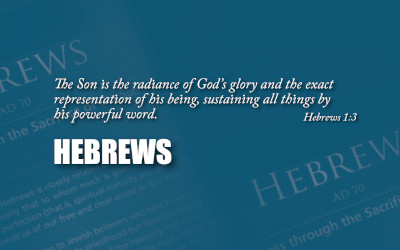Hebrews 6:1-20
Move on to maturity. Once enlightened. Better things relating to salvation. Fulfillment of your hope. The certainty of God’s promise.
(Bấm vào đây để đọc tiếng Việt)
 "1Therefore we must progress beyond the elementary instructions about Christ and move on to maturity, not laying this foundation again: repentance from dead works and faith in God, 2teaching about ritual washings, laying on of hands, resurrection of the dead, and eternal judgment. 3And this is what we intend to do, if God permits. 4For it is impossible in the case of those who have once been enlightened, tasted the heavenly gift, become partakers of the Holy Spirit, 5tasted the good word of God and the miracles of the coming age, 6and then have committed apostasy, to renew them again to repentance, since they are crucifying the Son of God for themselves all over again and holding him up to contempt. 7For the ground that has soaked up the rain that frequently falls on it and yields useful vegetation for those who tend it receives a blessing from God. 8But if it produces thorns and thistles, it is useless and about to be cursed; its fate is to be burned. 9But in your case, dear friends, even though we speak like this, we are convinced of better things relating to salvation. 10For God is not unjust so as to forget your work and the love you have demonstrated for his name, in having served and continuing to serve the saints. 11But we passionately want each of you to demonstrate the same eagerness for the fulfillment of your hope until the end, 12so that you may not be sluggish, but imitators of those who through faith and perseverance inherit the promises.
"1Therefore we must progress beyond the elementary instructions about Christ and move on to maturity, not laying this foundation again: repentance from dead works and faith in God, 2teaching about ritual washings, laying on of hands, resurrection of the dead, and eternal judgment. 3And this is what we intend to do, if God permits. 4For it is impossible in the case of those who have once been enlightened, tasted the heavenly gift, become partakers of the Holy Spirit, 5tasted the good word of God and the miracles of the coming age, 6and then have committed apostasy, to renew them again to repentance, since they are crucifying the Son of God for themselves all over again and holding him up to contempt. 7For the ground that has soaked up the rain that frequently falls on it and yields useful vegetation for those who tend it receives a blessing from God. 8But if it produces thorns and thistles, it is useless and about to be cursed; its fate is to be burned. 9But in your case, dear friends, even though we speak like this, we are convinced of better things relating to salvation. 10For God is not unjust so as to forget your work and the love you have demonstrated for his name, in having served and continuing to serve the saints. 11But we passionately want each of you to demonstrate the same eagerness for the fulfillment of your hope until the end, 12so that you may not be sluggish, but imitators of those who through faith and perseverance inherit the promises.
THE CERTAINTY OF GOD'S PROMISE
13Now when God made his promise to Abraham, since he could swear by no one greater, he swore by himself, 14saying, “Surely I will bless you greatly and multiply your descendants abundantly.” 15And so by persevering, Abraham inherited the promise. 16For people swear by something greater than themselves, and the oath serves as a confirmation to end all dispute. 17In the same way God wanted to demonstrate more clearly to the heirs of the promise that his purpose was unchangeable, and so he intervened with an oath, 18so that we who have found refuge in him may find strong encouragement to hold fast to the hope set before us through two unchangeable things, since it is impossible for God to lie. 19We have this hope as an anchor for the soul, sure and steadfast, which reaches inside behind the curtain, 20where Jesus our forerunner entered on our behalf, since he became a priest forever in the order of Melchizedek. (Hebrews 6:1-20)
MOVE ON TO MATURITY
“1Therefore we must progress beyond the elementary instructions about Christ and move on to maturity, not laying this foundation again: repentance from dead works and faith in God, 2teaching about ritual washings, laying on of hands, resurrection of the dead, and eternal judgment. 3And this is what we intend to do, if God permits.” (Hebrews 6:1-3)
The author of Hebrews exhorts us to progress toward maturity by moving beyond the basic teachings. Before delving into what these elementary teachings are, let’s establish a foundation for our discussion. To do this, let’s reflect on Galatians 3:24:
Thus the law had become our guardian until Christ, so that we could be declared righteous by faith. (Galatians 3:24)
This verse suggests that relying on the law won’t lead to justification by faith.
Now, let’s explore the elementary instructions. Among these, the concept of “faith in God” emerges as the foremost and fundamental teaching, without which other teachings lose their relevance. “Resurrection of the dead and eternal judgment” seems interconnected, as indicated in the Gospel of John.
28“Do not be amazed at this, because a time is coming when all who are in the tombs will hear his voice 29and will come out - the ones who have done what is good to the resurrection resulting in life, and the ones who have done what is evil to the resurrection resulting in condemnation. (John 5:28-29)
This verse touches upon justification through adherence to the law, which is an elementary teaching.
“Ritual washings and laying on of hands” pertain to Old Covenant practices and atonement for sins, which are also elementary teachings.
All these elementary teachings can be grouped under the term “dead works,” signifying actions that may appear virtuous and religious but do not lead to God’s righteousness. In other words, they do not genuinely stir repentance in the heart.
Establishing a foundation means imparting the principles that form that foundation. However, as the author of Hebrews suggests, we should establish a fresh foundation built upon faith in Christ rather than relying on elementary teachings rooted in the Old Covenant any longer.
ONCE ENLIGHTENED
“4For it is impossible in the case of those who have once been enlightened, tasted the heavenly gift, become partakers of the Holy Spirit, 5tasted the good word of God and the miracles of the coming age, 6and then have committed apostasy, to renew them again to repentance, since they are crucifying the Son of God for themselves all over again and holding him up to contempt. 7For the ground that has soaked up the rain that frequently falls on it and yields useful vegetation for those who tend it receives a blessing from God. 8But if it produces thorns and thistles, it is useless and about to be cursed; its fate is to be burned.” (Hebrews 6:4-8)
Enlightenment involves transitioning from the old foundation of elementary teachings to the new foundation centered on faith in Christ. It is exclusively through faith in Christ that individuals “become partakers of the Holy Spirit.” They have also “tasted the good word of God and the miracles of the coming age” through Jesus.
However, by reverting to the old foundation of elementary teachings, particularly the law, they have effectively “committed apostasy.” Jesus was crucified to provide them with a fresh path to God through faith, and returning to the law makes it impossible to “renew them again to repentance,” as this would necessitate Jesus’ crucifixion anew.
In John 15:5, Jesus conveys, “I am the vine, and you are the branches. If you abide in me and I in you, you will bear much fruit; apart from me, you can do nothing.” Yet, to abide in Him, one must release their grasp on the guardian, the law. Therefore, if you persist in adhering to the foundation of elementary teachings, you can expect to yield only “thorns and thistles.”
BETTER THINGS RELATING TO SALVATION
“9But in your case, dear friends, even though we speak like this, we are convinced of better things relating to salvation.” (Hebrews 6:9)
Achieving the “better things relating to salvation” necessitates that you no longer build your connection with God upon the foundation of elementary teachings.
FULFILLMENT OF YOUR HOPE
“10For God is not unjust so as to forget your work and the love you have demonstrated for his name, in having served and continuing to serve the saints. 11But we passionately want each of you to demonstrate the same eagerness for the fulfillment of your hope until the end, 12so that you may not be sluggish, but imitators of those who through faith and perseverance inherit the promises.” (Hebrews 6:10-12)
Is this perhaps the blessed assurance to which the author of Hebrews alludes? It is widely recognized that God established the Old Covenant to guide people toward Christ, underscoring that righteousness cannot be obtained through adherence to the law. As a result, one could anticipate that, with the advent of the New Covenant, people would be eager to explore how they could achieve their salvation through it. However, it appears that many individuals may not be particularly concerned about whether the path they are on will ultimately lead them to their desired destination.
Jesus recognized this tendency when He remarked, “No one after drinking old wine wants the new, for they say, ‘The old is better.’” (Luke 5:39).
THE CERTAINTY OF GOD’S PROMISE
“13Now when God made his promise to Abraham, since he could swear by no one greater, he swore by himself, 14saying, “Surely I will bless you greatly and multiply your descendants abundantly.” 15And so by persevering, Abraham inherited the promise. 16For people swear by something greater than themselves, and the oath serves as a confirmation to end all dispute. 17In the same way God wanted to demonstrate more clearly to the heirs of the promise that his purpose was unchangeable, and so he intervened with an oath, 18so that we who have found refuge in him may find strong encouragement to hold fast to the hope set before us through two unchangeable things, since it is impossible for God to lie. 19We have this hope as an anchor for the soul, sure and steadfast, which reaches inside behind the curtain, 20where Jesus our forerunner entered on our behalf, since he became a priest forever in the order of Melchizedek.” (Hebrews 6:13-20)
This passage speaks of God’s unchanging nature and faithfulness in fulfilling His promises. It begins by recounting how God made a promise to Abraham and swore by Himself, emphasizing the certainty of His word. The passage illustrates that God’s promises are unbreakable and serve as an anchor for the soul. It highlights the role of Jesus as our high priest, who has entered the heavenly sanctuary and secured our hope, acting as the intermediary between God and humanity. Ultimately, Hebrews 6:13-20 reinforces the idea that God’s promises, fulfilled through Jesus, offer believers unwavering hope and assurance.
The former Levitical priesthood provided a momentary respite from sins, but Jesus, as part of the eternal Melchizedek priesthood without a beginning or end, can truly remove sins. This allows us to access the most sacred part of the temple, which was previously off-limits to ordinary individuals.
Nghi Nguyen
- Scripture quoted by permission. All scripture quotations, unless otherwise indicated, are taken from the NET Bible® copyright ©1996-2006 by Biblical Studies Press, L.L.C. All rights reserved.
Disclaimer: This is my own opinion on the topic, which does not necessarily reflect the church's theology, or beliefs of the individuals in it — Nghi Nguyen
